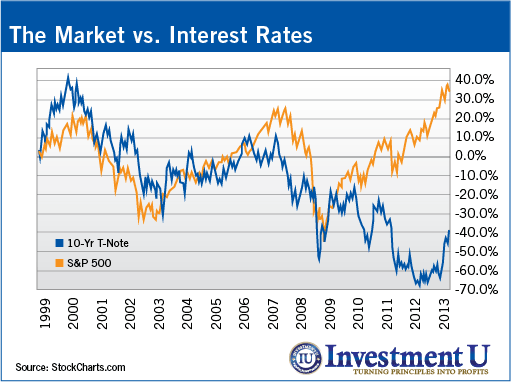How Rising Interest Rates Will Affect You
Stock-Markets / US Interest Rates Aug 30, 2013 - 10:15 AM GMTBy: Investment_U
 Marc Lichtenfeld writes: According to a survey, 63% of investors don’t know how rising interest rates will affect their portfolios.
Marc Lichtenfeld writes: According to a survey, 63% of investors don’t know how rising interest rates will affect their portfolios.
They should, because rates are climbing fast. The 10-year Treasury is at nearly 3%. Just three months ago, it was under 2%. The 10-year Treasury yield can affect mortgage rates, interest rates on credit cards… and especially your portfolio.
If you’re one of the 63%, let me explain what continued rising interest rates will mean to you.
You will lose money in bond funds. Bond funds own bonds in their portfolios. When interest rates rise, bond prices fall because the lower-rate bonds are less valuable.
Think about it. Suppose you bought a 10-year bond paying 2% a few months ago. And today the 10-year bond yields 3%. If you wanted to sell your bond, you would have to sell it at a discount. No one would pay the same amount you did for a bond that yields less than what can be obtained in the open market.
So bond prices fall when rates go up. As a result, bond fund prices fall as well because the value of the bonds they own goes down.
The problem is that unless yields fall again back to all-time lows, the bond fund prices will not recover. Even if you’re a long-term investor, you’ll lose money. You’ll continue to receive income from the funds, but chances are that when you sell the fund, you will receive less money than you paid for it.
If you insist on staying in bond funds, be sure they’re short-term. The shorter time to maturity, the less the damage will be.
You don’t have to lose money on individual bonds. If you own individual bonds – whether they’re investment-grade corporates, junk bonds, munis or Treasurys – hang on to them until maturity.
Although the bond prices will fall if rates rise, that won’t matter when the bonds mature and you sell them at par ($1,000 per bond in most cases).
Let’s say you bought a corporate bond for $1,000 with a yield of 4% and it matures in 10 years. Your bond value might slip to $900 as rates go higher. But you’ll continue to collect your 4% per year, every year. At maturity, no matter where interest rates are, the company will pay you back your $1,000.
So if you’re going to buy or own bonds, be sure the plan is to own them until they mature and you’ll get your principal back.
Dividend stocks could fall temporarily. You might be shocked that I’m saying this since I’m The Oxford Club’s dividend guy. But it’s the truth. If investors can get yield from a Treasury or other high-quality bond without taking stock market risk, some will do so.
That could lead to a temporary sell-off in dividend stocks. We’ve already started to see some stocks, such as utilities, slide as rates dramatically rose in August.
But for long-term investors, it doesn’t matter. If your dividend stocks fall, you can buy new shares at lower prices.
And if you reinvest your dividends, a falling stock price is the best thing that could happen to you. Your reinvested dividends will accumulate more shares, which will spin off more dividends, which will buy more shares, which will spin off more dividends…
Stocks go up over the long term. Dividend-paying stocks outperform the general market. So long-term investors shouldn’t be worried about any short-term sell-offs.
The stock market doesn’t have to fall after rates rise. In fact, quite the opposite. Look at the chart below that pits the S&P 500 against the yield on the 10-year Treasury. You’ll notice that from 1999 to 2010 the two were pretty much in sync. It wasn’t until 2010, when the Fed began its quantitative easing program, that the two lines started to diverge.

As you can see, even the latest surge in the 10-year Treasury yield did not stop the market from going higher.
If rates shoot higher when the Fed puts the brakes on quantitative easing, there will likely be scared investors everywhere. Now that you’re one of the 37% instead of the 63%, you’re more likely to profit from others’ panic.
Good investing,
Marc
Source: http://www.investmentu.com/2013/August/how-rising-interest-rates-will-affect-you.html
Copyright © 1999 - 2013 by The Oxford Club, L.L.C All Rights Reserved. Protected by copyright laws of the United States and international treaties. Any reproduction, copying, or redistribution (electronic or otherwise, including on the world wide web), of content from this website, in whole or in part, is strictly prohibited without the express written permission of Investment U, Attn: Member Services , 105 West Monument Street, Baltimore, MD 21201 Email: CustomerService@InvestmentU.com
Disclaimer: Investment U Disclaimer: Nothing published by Investment U should be considered personalized investment advice. Although our employees may answer your general customer service questions, they are not licensed under securities laws to address your particular investment situation. No communication by our employees to you should be deemed as personalized investment advice. We expressly forbid our writers from having a financial interest in any security recommended to our readers. All of our employees and agents must wait 24 hours after on-line publication or 72 hours after the mailing of printed-only publication prior to following an initial recommendation. Any investments recommended by Investment U should be made only after consulting with your investment advisor and only after reviewing the prospectus or financial statements of the company.
Investment U Archive |
© 2005-2022 http://www.MarketOracle.co.uk - The Market Oracle is a FREE Daily Financial Markets Analysis & Forecasting online publication.



